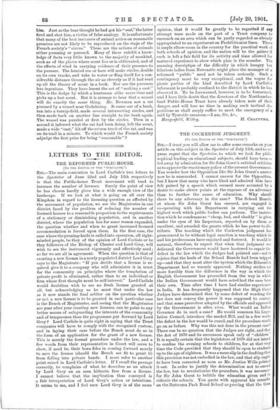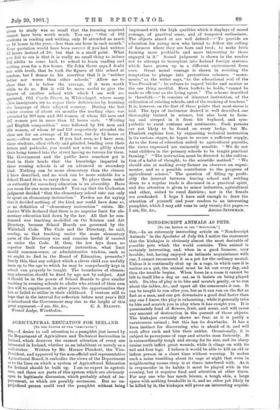THE COCKERTON JUDGMENT.
rro THE EDITOR OF THE "SPECTATOR:] trust you will allow me to offer some remarks on your article on this subject in the Spectator of July 13th, and to ex- press regret that the Spectator, to which we look for philo. sophical leading on educational subjects, should have been so led away by admiration for Sir John Gorses satirical criticism as to approve the reactionary policy of the present Government. You wonder how the Opposition like Sir John Gorses answer now he is unmuzzled. I cannot answer for the Opposition, but I know that many who have liked and admired him have felt pained by a speech which seemed more actuated by a desire to make clever points at the expense of an adversary than to further the cause of education. Why should there be any adversary in the case ? The School Boards, at whom Sir John Gorst has sneered, are engaged in co-operating with his Department in carrying out the highest work which public bodies can perform. The instrue. tion which he condemns as "cheap, bad, and shoddy" is giver under the eyes of his Inspectors, reported on by them a. excellent, and awarded the grants which he has power to di- tribute. The teaching which the Cockerton judgment ha. pronounced to be without legal sanction is teaching which lp and his predecessors have enjoined and fostered. It would), natural, therefore, to expect that when that judgment iva. delivered the Government would have hastened to repair the defect in the law which the Judges had pointed out—not to rejoice that the heels of the School Boards had been tripped up—and that they must alter the system which the Education Department had so warmly approved. Nothing strikes me more forcibly than the difference in the way in which the English Government has proceeded from the way in which the Indian Government would have acted had the case been their own. Time after time I have had similar experience, in India. It has frequently happened that the High Court Judges have determined that by some defect of wording tl e law does not convey the power it was supposed to convey. and that some procedure adopted by the officials and approved by the Government is ultra vire& What would an Indian Governor do in such a case? He would summon his Legis. lative Council, introduce the needed Bill, and in a few weelo the defect in the law would be cured, and the procedure would go on as before. Why was this not done in the present ease? There can be no question that the Judges are right, and that the Act of 1870 and its successors speak only of "children.' It is equally certain that the legislators of 1870 did not intend to confine the evening schools to children, for at that very time the Code provided that they should be open to students up to the age of eighteen. It was a mere slip in the drafting that this provision was not embodied in the law, and that slip ought to have been corrected as soon as Mr. Justice Wills pointed it out. In order to justify the determination not to amend the law, but to revolutionise the procedure, it was necessarY for Sir John Gorst to belittle the education given and lo ridicule the schools. You quote with approval his remarks on the Battersea Park Road School as proving that the time given to study was so small that the learning acquired cannot have been worth much. You say : "Out of 102 students in reading and writing, only 10 attended as much as 10 hours in the year,—less than one hour in each month." Your quotation would have been correct if you had written 12 hours instead of 10; but that is a small point. What you fail to see is that it is really no small thing to induce 102 adults to come back to school to learn reading and writing, even for a few hours. Sir John Gorst says, I doubt not with truth, that he took the figures of this school at random, but I demur to his assertion that it is "neither better nor worse than other schools." Allow me to show that it is below the average, if it were worth while to do so. But it will be more useful to give the figures of another school with which I am well ac- quainted, Old Castle Street, in Whitechapel, where many :lien immigrants try to repair their deficiencies by learning the language of their adopted country. During the last winter session of about six months the reading class was attended by 393 men and 304 women, of whom 125 men and 167 women put in more than 12 hours each. "Writing and English composition" were followed by 104 men and 334 women, of whom 49 and 159 respectively attended the class not for an average of 12 hours, but for 12 hours or more,—often much more. If you had seen, as I have seen, these students, often elderly and grizzled, bending over their letters and pothooks. you would not write so glibly about their being turned into the street having no terrors for them. The Government and the public have somehow got it fixed in their heads that the knowledge imparted in these evening schools is of an advanced or secondary kind. Nothing can be more elementary than the classes I have described, and no work can be more suitable for a School Board than to carry them on. To place them under an authority for secondary education is an absurdity. Have you room for one more remark? You say that the Cockerton judgment decided "that the elementary school rate can only be spent on elementary instruction." Pardon me for saying that it decided nothing of the kind, nor could have done so, as no definition of "elementary instruction" exists. Mr. Justice Wills declared that there is no superior limit for ele- mentary education laid down by the law. All that he con- demned was teaching modelled on the Science and Art Directory, because School Boards are governed by the Whitehall Code. The Code and the Directory, he said, overlap, so that teaching under the more elementary parts of the Directory was and remains lawful if carried on under the Code. If, then, the law lays down no superior limit for elementary instruction, what limit should common-sense, or administrative wisdom, such as we ought to find in the Board of Education, prescribe ? Surely this, that any subject which a clever child can usefully learn up to the age to which he may be compulsorily kept in school can properly be taught. The boundaries of elemen- tary education should be fixed by age, not by subject. And it should be in the power of School Boards to give similar teaching in evening schools to adults who attend of their own free will to supplement, in after years, the opportunities they lost or failed to utilise in their childhood. I venture still to hope that in the interval for reflection before next year's Bill Is introduced the Government may rise to the height of this great argument.—I am, Sir, &c., C. A. ELLIOTT. Wressil Lodge, Wimbledon.



































 Previous page
Previous page